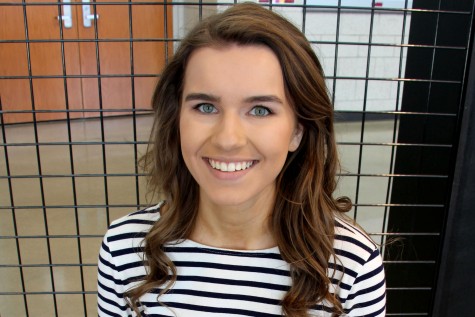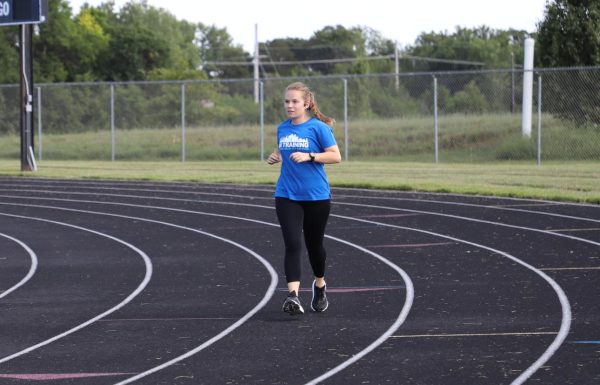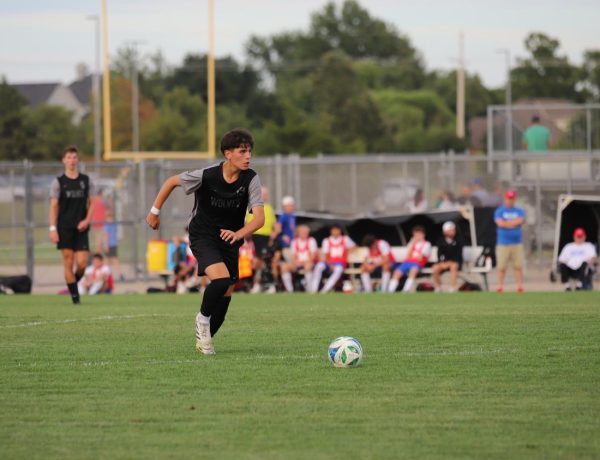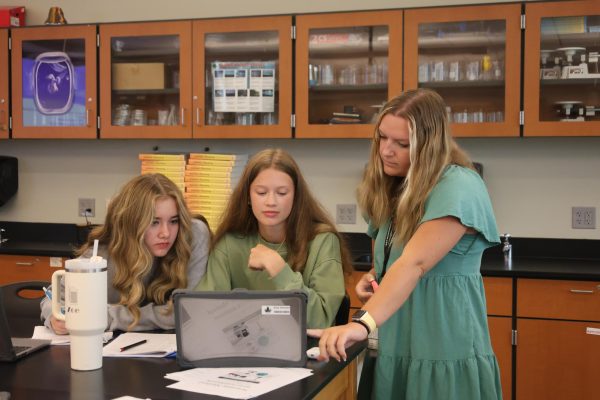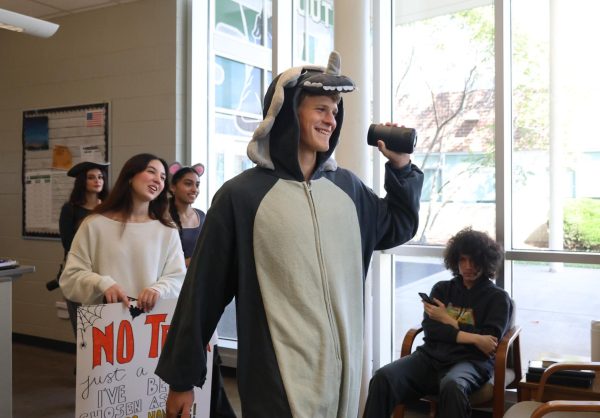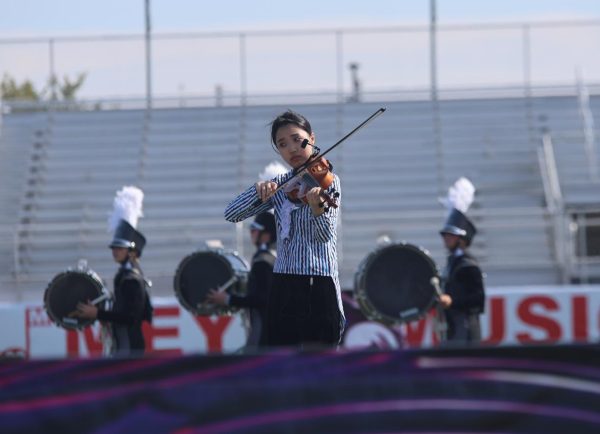Students adjust to their lives in foster homes
When junior Unique Brooks returns home every evening from her after-school job, she’s met with “how are you?”s and welcoming faces asking how her day went. If she had a difficult day at school or has exciting information to share, she knows she has a home that will listen. But this hasn’t always been Brooks’s life. Just a year and a half ago, Brooks entered foster care after being removed from an abusive home.
Brooks grew up never knowing her father. Her mother gave birth to her as a teenager, and her parents split up a year later. Brooks spent her adolescent years switching between living with her grandmother in Las Vegas and her mother in Wyandotte County. In sixth grade, her mother passed away from the swine flu, and despite her mother’s family’s efforts, she was sent to live with her father in Olathe.
Brooks never knew why her father wasn’t in her life, but shortly after moving into his home, she realized why. For four years, Brooks endured emotional, verbal and physical abuse. She never spoke out for fear that the abuse would only get worse. However, after Brooks realized that her father’s violent ways posed a threat to her life and to the lives of those in her household, she alerted a teacher about the years of abuse she had faced. That same day, the police were called, social workers were notified and Brooks was taken into the custody of foster care with her only possessions being the clothes on her back.
Shortly after, Brooks was placed into a family and began attending Shawnee Mission North during the first semester of her sophomore year. Although she was initially reserved toward the idea adjusting to a new family and school, she eventually became more accepting of her new environment.
“When I first got put into foster care, I was more ashamed,” Brooks said. “I felt like it was my fault, and I felt like I didn’t have any family. I didn’t talk to anybody, and I didn’t want to have a relationship with the family — I just had animosity toward everybody. It’s kind of hard to hold a grudge for that long, so I just accepted [the situation].”
However, Brooks’s abusive past didn’t end once she entered foster care. As her time living with the family progressed, the physical abuse in the home worsened. In January, after a physical altercation between her foster father and foster sister, the police removed Brooks from the home. Brooks then moved into Tim and Suzanne Gay’s home and had to adjust to living with a family vastly different than her prior experiences. Her new family set expectations for Unique that she never had before — she was encouraged to become involved in school and to develop study habits in order to earn high grades.
“Just because [Brooks] is a foster child, doesn’t mean that she has less benefits of being in our family or different expectations — we treat her as if she’s a member of our family,” Tim said. “That’s the only way we knew how to handle the situation because, otherwise, if you treat all your biological kids this way, and you have special expectations for the foster child, then you’re constantly treating them in a way that says, ‘I’m different,’ or, ‘I’m not part of this family.’”
Brooks’s life with the Gays involved more than adapting to a new family and a new set of expectations. Brooks had to adjust not only to a new curriculum far more rigorous than what she had been taught in her previous schools, but also a culturally different school. While Brooks was accustomed to going to racially diverse schools in urban settings, attending a school in an affluent, predominantly white suburb created some obstacles when learning the ways of a new school. Brooks said that she had difficulty finding students at Southwest who could relate to her culture and background.
“If you come from a more city type of high school, and then you come to suburban Southwest, it is night and day,” counselor Kristi Dixon said. “You can walk around with your guard up at a more city type of school, and that’s necessary because you spend the day protecting yourself either physically and emotionally, and then you come to Southwest — that’s for kids who transfer regardless. Coming from a big city setting to small suburban high school is just mind-blowing.”
Brooks said that Dixon was instrumental in her transition to Southwest. Dixon taught Brooks how to manage her aggression toward insensitive students and presented her office as a place to go when Brooks needed to talk about both the good and the bad in her life. Dixon also introduced Brooks to options for her future that she had never thought about before. For the first time, Brooks realized that she was capable of continuing her education past high school.
“At Southwest, [the teachers] really strive for the future,” Brooks said. “When I went to SM North, I was like, ‘I’m not going to college,’ because that was never an option. Then when I came here, [the counselors] were like, ‘Your grades really aren’t that bad.’ They told me I could go to college, and that made me work even harder because I really want to go to college.”
Switching high schools three times took a toll on Brooks’s grades. While she was used to earning grades in the A to B range, when she switched mid-semester to SM North, her grades suffered. Brooks said that a combination of bullying and not being encouraged to focus on school by those around her further discouraged her to attend class. However, since starting at Southwest, Brooks has become more focused on her schoolwork and has received better grades than she has before.
“With foster kids, there’s not always somebody there telling them, ‘You are smart. You can do this,’” Dixon said. “When you bounce around from school to school, sometimes your grades reflect your experience — not your ability. For a lot of [foster] kids, they look at [a bad grade] as, ‘Oh, I got this bad grade. I must not be very smart,’ and pretty soon it’s, ‘I can’t go to college,’ instead of, ‘I’ve had some major obstacles and I am working really hard to overcome them.’”
Dixon said that when she works with students who are in foster care, she helps them plan for their lives post-high school, whether that be college, employment or simply earning a high school diploma, the latter of which can be difficult for a student switching to schools with different graduation requirements. While Brooks is currently on track to graduate on time, other students in foster families often fall behind.
“[Being a foster kid] can make graduation take that much longer if for no other reason because of simple number of credits,” Dixon said. “When things like that start to stretch out, it wears on you, and sometimes you doubt yourself, and when you doubt yourself, you’re less like to dream big and feel like you deserve good things. With most kids, somehow it translates to, ‘It’s all my fault’ — it’s just not. Then you start getting down on yourself, and then you don’t feel good about going after your dreams.”
Brooks said being a foster kid and coming from an abusive home has made it difficult for her to build long-lasting, trusting relationships. She said often she doesn’t trust others, and the aspect of knowing that her home and school are only temporary leads her to not get attached to others. Dixon said that this lack of attachment is rooted in the sense of loss that comes with being a foster kid — either the loss of the family itself or the loss of the idea of having a stable family.
“Everything around us in our society tells us the people who are supposed to love you best in the world are your mom and dad,” Dixon said. “When that hasn’t been your experience, and when you’ve had that level of disappointment, especially when it’s been so consistent by the people who are supposed to you the best, it will be difficult to allow yourself to trust somebody because not only do you receive a whole lot of wonderful things when you trust the right person, but when you trust the wrong person, it’s awful.”
While being a foster kid has created challenges from Brooks when building relationships, it’s also taught her forgiveness toward those currently in her life and those in her past. Through court order, Brooks is not allowed to be in contact with her father until she is 18. But through the time that she’s had since leaving her biological home, Brooks has learned to both understand and forgive her father.
“I’m still angry at [my father] for what he did,” Brooks said. “But before, it was more anger and disgust — I couldn’t even look at him. Now I don’t want to hold all of that anger. You can’t just come from a normal home and be like that, so obviously something had to happen to him that made him want do all that kind of stuff. I’m still in the process, but I just want to learn how to forgive him for everything that he did.”
When Brooks moved in with the Gays, she met their adoptive daughter, senior Makaila Gay, who was in foster care before being adopted at the age of 17. Makaila said that she never forced Brooks to tell more of her story than she was comfortable with, but she soon found that she and Brooks shared more similarities than they thought.
Makaila and her two biological siblings were put up for adoption after their drug- and alcohol-addicted parents could no longer provide for them. A family from her church that was unable have children was willing to adopt all three siblings, which seemed to be a suitable fit for them. However, the parents took their mental stress out on Makaila and her siblings, especially her older brother. As Makaila aged and took on more responsibility, the physical abuse toward her and her siblings increased.
When Makaila was 13, she and her siblings were taken out of their adoptive home. After living in a temporary home, Makaila entered a foster placement with her best friend’s family. But similar to Brooks’s situation when moving in with a new family, this home was also abusive. While the family initially provided a stable home for Makaila, the parents placed the blame for their deteriorating marriage on Makaila. Makaila suffered emotional abuse for three years before deciding to leave the family. However, the struggles that Makaila faced allowed her to build closer relationships with those in her community and strengthen her faith in God.
“If I was younger, I would have grown up believing that it was me [causing the problems], but I had a great system of people outside this family, so I was able to talk to them about what was going on,” Makaila said. “They just continued to encourage me and tell me that it wasn’t my fault. I knew in my heart that it wasn’t me, but it was hard to continually hear that, and I just kept fighting and persevering through the things that they were saying. My faith was a really big contributor in everything that I was going through — so just trusting God that He had something better for me and just to continue to live this life trying to glorify Him.”
In the process of meeting the requirements for their license to foster, Tim and Suzanne were introduced to Makaila through the instructor of the class for foster-parent hopefuls. After spending time with Makaila and hearing her story, they approached the instructor to adopt Makaila. Makaila moved in with the Gays the summer before her junior year — just a few weeks after meeting the family. The lengthy adoption process was finalized almost a year later.
“I just think the proper love and care that I have received over these past almost two years has really built in me a stature of what I have always been, but it’s just been able to come out in the light now,” Makaila said. “I’ve always had these values; I’ve always been who I’ve been, but it definitely is easier to actually have an attitude change when you’re being encouraged.”
Makaila said that she has always known that she wants to “minister to the ones marked off,” but growing up as a foster kid made her realize that for her, “the ones marked off” meant foster kids. As she grew older, she began sharing her story more and more with others. Recently, she spoke at a fundraising luncheon to over 600 people about her experiences as a foster kid.
“I took my story, and I see it as a part of who I am — it’s not just a story or testimony,” Makaila said. “I want to share with you because I can, and I want to be able to share it in a way where at least you can get something out of it. I don’t want people to take pity on me. There’s no need for you to give me your condolences because I wouldn’t have wanted anything to happen any other way. I’m perfectly content in who I am and who I’ve become because of my experiences.”
Although Brooks is planning to move to Wyandotte County to live with her grandmother this summer, Tim said said that it’s important to provide her a stable family environment for the time that she lives with them.
“There’s immense benefit to being in a loving, caring, committed, stable family environment — whether you’re a foster child or not a foster child,” Tim said. “I believe that we’re created to be in a community. We’re created to be in a family — that’s just the most intense community you can have. People in general thrive and benefit from that environment, but I think that’s especially important for kids in foster homes.”


